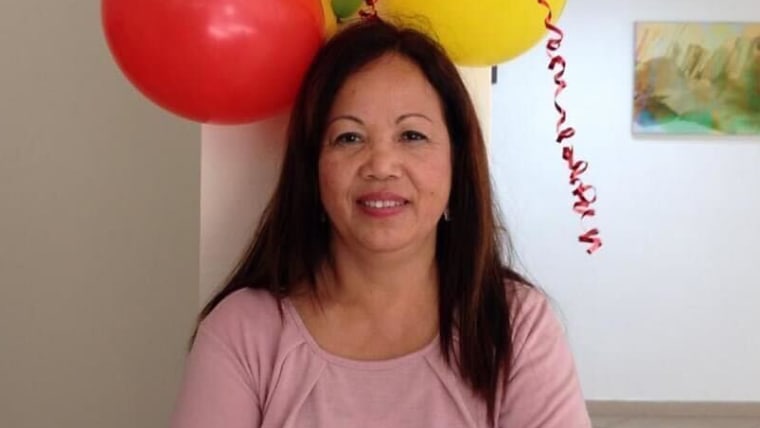A Filipino caregiver in Israel says she feels it’s her “duty” to remain with her elderly employer, for whom she’s worked the last five months, despite the monumental tensions and instability in the region.
Lourdes Levi, who works in-home night shifts in Tel Aviv for a 96-year-old man with Alzeheimer’s, told NBC News that, while she feels fear, she doesn’t plan on leaving the area, regardless of how dangerous conditions may become amid the ongoing war in Gaza.
“It’s like a call of responsibility that we need to take for our employer. There’s nobody to take care of them,” Levi, 65, said. “And even on the other side of your mind, you want to leave and get yourself to safety, deep inside your heart, you are thinking about your employer.”
"Even on the other side of your mind, you want to leave and get yourself to safety, deep inside your heart, you are thinking about your employer.”
Lourdes Levi, a caregiver in Tel Aviv
Levi is among roughly 30,000 Filipinos living in Israel, the majority of whom work as caregivers for the country’s aging population. Several caregivers of Filipino descent have already died in the violence in Gaza, the Philippines government confirmed. One of them, Angelyn Peralta Aguirre, was killed while taking cover with her employer in a bomb shelter, according to Filipino state media.
“Despite having a chance to flee the Hamas terror attacks, Angeline showed unbelievable humanity and loyalty by remaining by Nira’s side during the violence, resulting in both of them being brutally murdered by Hamas,” Jerusalem Deputy Mayor Fleur Hassan-Nahoum said on X.
As of Monday, at least 1,400 have been killed in Israel and 5,087 in Gaza since Palestinian militant group Hamas launched a multipronged attack on Oct. 7. Even though Tel Aviv is some 50 miles away from the epicenter of the violence, Levi, who’s been a caregiver in Israel for over two decades, said that the war has altered many aspects of her work. Rockets can be heard flying overhead at times, she said. And she feels it’s her job to get her patient to safety.
“Suddenly the rockets will bomb and you need to put him in the wheelchair and you need to run to the bomb shelter. This is our life now.”
lourdes Levi
“When you’re inside the house, you feel like family. You need to protect them,” Levi said. “Suddenly the rockets will bomb and you need to put him in the wheelchair and you need to run to the bomb shelter. This is our life now.”
The 65-year-old shuttles between her home in the northern city of Haifa and Tel Aviv, by train, to work 11-hour night shifts four times a week. Levi said her patient needs her assistance with eating, going to the restroom and making his sleeping arrangements. She said she’s gotten accustomed to lying on the floor and covering her head at the sound of rockets. For many caregivers like her, Levi says the only way to carry on is to throw themselves into work.
“We’re giving our hearts 100% — our hearts and our minds — even when we are in a dangerous time,” Levi said.
She added: “What we are facing now, we don’t feel that we are safe. But we are trying to be safe and we are trying to live normally.”
Levi, who’s also a community leader and founded the organization Kalahi, which aims to serve fellow Filipinos working overseas, said she’s heard from caregivers, including those near Gaza, who are currently grappling with mental health issues due to the inability to leave their employer’s homes and seek community and comfort.
“It’s a very hard situation that the caregivers that are in the neighborhood of Gaza, they are more facing the challenges,” Levi said. “They are not allowed to go out yet, they need to keep themselves inside. So it’s giving them nerves, and giving them fear.”
Some caregivers in Israel have left for the Philippines as well, with concerns around the escalating violence, Levi said. But she has no plans to leave.
“I want to stay here and help my people, help my employer,” she said.
